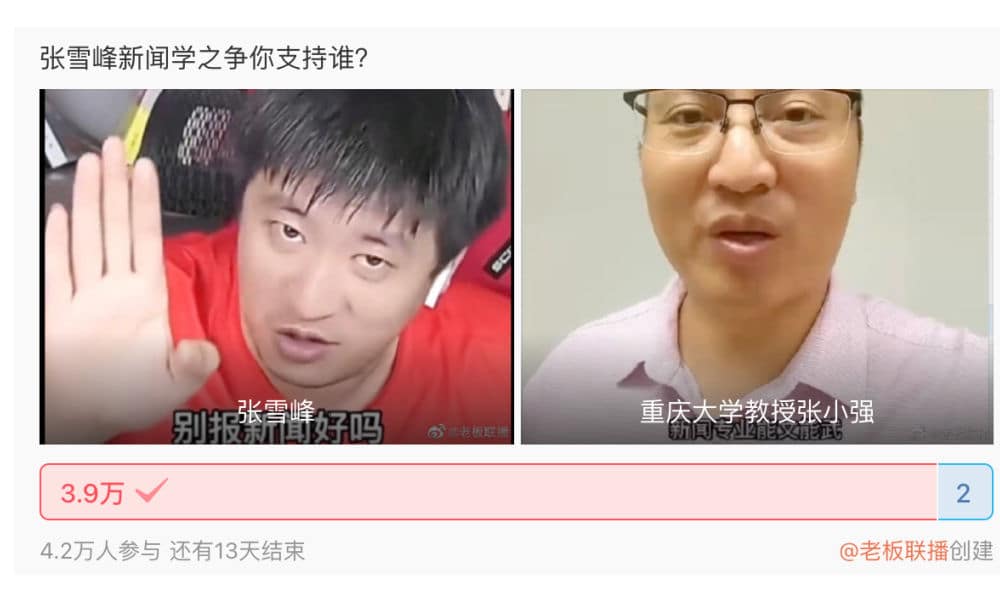With the announcement of the 2023 Chinese National College Entrance Examination (Gaokao) scores this week, the process of selecting university preferences has become the focal point for more than 12.9 million families in China.
Zhang Xuefeng (张雪峰), an internet celebrity widely recognized as the “famous teacher for postgraduate entrance exams,” has found himself at the center of an online controversy for advising students against applying for journalism programs.
According to a report by Lianhe Zaobao (联合早报), the incident originated from a livestreamed phone conversation between Zhang Xuefeng and a parent of a student, who was seeking advice.
Upon learning that a science student from Xinjiang had estimated a score of 590 – surpassing the cutoff for admission to first-tier universities, – while expressing an interest in applying for the journalism program at Sichuan University, Zhang Xuefeng reacted with some extreme emotions and remarks.
He advised against pursuing journalism, stating, “Don’t apply for journalism! Any other major you choose blindly would be better than journalism.” He even went as far as saying that if he were the parent, he would “definitely knock the child unconscious if they insisted on studying journalism” (“这孩子非要报新闻学,我一定会把他打晕”).

A screenshot of Zhang Xuefeng’s live stream phone call session in which he dissuaded the student from selecting Journalism. The line reads: “Just don’t select Journalism, ok?”
After a video of their livestreamed conversation was shared by Yan Tu Education, Zhang Xuefeng’s educational company, on their official Douyin account, Zhang’s provocative remarks gained attention from various parties, including journalism scholars and Chinese (state) media outlets.
The ‘Zhang vs Zhang’ online debate started in mid-June when Professor Dr. Zhang Xiaoqiang (张小强) from Chongqing University’s School of Journalism criticized Zhang Xuefeng’s comments, describing them as “harmful and misleading to the public” (“害人不浅,误导公众”).
According to media outlet The Paper, Dr. Zhang argues that the field of journalism is applicable to many different domains, and parents can trust the journalism departments in prominent Chinese universities and colleges.
He believes that the negative perception of the journalism profession stems from the narrow belief that it only leads to careers in traditional media. However, Dr. Zhang asserts that graduates from journalism departments go on to work in various fields.
He suggested that journalism graduates are often recruited for communication roles, and that they can find employment at government organizations, state-owned enterprises, new media companies, or even gaming start-ups. He also cautioned against being deceived by individuals like Zhang Xuefeng, whom he referred to as a mere “internet celebrity.”
Three Reasons Not To Pursue Journalism Major in China
While there are authoritative voices defending journalism education, there is still substantial support for Zhang Xuefeng’s perspective on discouraging journalism as a career choice.
This support mainly stems from three primary reasons: the perceived impracticality of the profession, doubts about the substantive nature and effectiveness of journalism education, and concerns about the limited freedom and liberal values within the field.
1. Not Practical (“无用”)
Firstly, a journalism degree has been deemed as “impractical” as it cannot guarantee good employment prospects.
Zhang Xuefeng dissuades students from pursuing journalism because, according to him, choosing this major would make it hard to secure a livelihood. For families with limited resources, it is important to choose a field of study that is practical and will enable young people to support themselves (“吃上饭”).
He also emphasizes the need to consider real-life circumstances rather than blindly following prescribed norms. Zhang said, “I am not targeting anyone or any specific profession. I am only providing suggestions based on employment situations. If your child cannot find a job, the responsibility lies not with the teachers but with you as parents!”
However, individuals like Dr. Zhang Xiaoqiang strongly oppose such practicalism. On June 17th, during an interview with Fengmian News (封面新闻), Professor Zhang Xiaoqiang stated that the primary consideration for choosing a major should be the student’s interest instead of employability.
Similarly, China Education Daily (中国教育报) published an article titled “Beware of the Misleading Influence of Internet Celebrity Remarks on College Major Selection” (“警惕网红言论误导志愿填报”), condemning Zhang Xuefeng’s statement for being overly arbitrary and shortsighted. The article emphasizes that personal interests and aspirations are also crucial in major selection and encourages young people to dream big and explore uncertainties.
However, many netizens support Zhang’s pragmatic approach and criticize scholars and state media for being overly idealistic and lacking understanding of the difficulties faced by ordinary people, and especially the younger generations, in China today.
The phrase “Why not eat meat?” (“何不食肉糜,” referring to those in positions of power and influence often failing to understand the hardships of common people) has become widely used in this discussion to highlight the discrepancy between scholars and authoritative voices who advocate for choosing majors based on interests and the economic constraints faced by many families.
“The lower the socioeconomic status of the family, the higher the cost of making mistakes in choosing a major, and therefore students should be more cautious in their decision-making,” commented one netizen, contradicting the argument that young people should pursue their passions without considering practicality.
2. Non-Educational (“无学”)
Studying journalism in universities has also faced criticism for being seen as “non-educational” due to the belief that a journalism degree is unnecessary to become a journalist and lacks a substantial theoretical foundation.
The non-profit organization ‘Narada Insights’ (@南都观察) posted an opinion piece by Liu Yuanju (刘远举), a research fellow at the Shanghai Institute of Finance and Law, on their Weibo account. In the piece, Liu highlights the failure of journalism education to provide in-depth content. Writing skills in journalism can be acquired by competent high school graduates, and the ability to gather and evaluate information is a fundamental skill that extends beyond the journalism field, primarily developed through life and work experiences. Therefore, Liu argues, it becomes challenging for students to acquire specific journalism-related skills and knowledge in universities.
Furthermore, Liu points out that journalism is often perceived to have a relatively low entry barrier, as many successful media professionals do not hold journalism degrees at all. On the other hand, knowledge in areas such as science, technology, economics, finance, or law can be advantageous for journalism work. In practice, media organizations often prefer candidates with these kind of educational backgrounds, as they are the ones with specialized expertise in specific industries.
3. Lack of Freedom (“无自由”)
One third complain and common perception of journalism departments is that they primarily teach students how to align with the state’s agenda, which has led to accusations of Chinese journalism being severely restrictive.
Author Liu Shen Leilei (六神磊磊), a former journalist of Politics and Law at the Chongqing Branch of Xinhua News Agency, shared his thoughts on this topic on Weibo. According to Liu, journalism departments lack substantial theories and instead instruct students to be obedient and comply with authorities.
One journalism graduate agreed with Liu’s post, suggesting that they were being compelled to say what the state wants: “I graduated in journalism, and I have a deep aversion to the field. We not only lack the freedom to speak the truth but are also deprived of the freedom to remain silent.”
Even if students possess enough passion to overcome the ‘impractical’ and ‘uneducational’ aspects of journalism education in Chinese universities, they may be disillusioned when they find that the practice of “journalism” in China does not align with their expectations and ideals.
In response to Liu Shen Leilei’s post, another commenter emphasized the profound challenge of reporting the truth in today’s context and asserted that “journalism has died (新闻已死).” This statement reflects the perception that authentic and truthful reporting has become virtually non-existent. Instead, media outlets are believed to employ various tactics to attract attention and disseminate state propaganda. On social media, there is a frequent suggestion to “rename journalism departments as propaganda departments” to reflect this perceived reality.
An End to the Debate?
As the Zhang versus Zhang discussion on pursuing a degree in Journalism continued, Dr. Zhang Xiaoqiang recently took to his social media to express his desire to end the debate, acknowledging the overwhelming criticisms from netizens (#张小强称给自己和张雪峰争论画上句号#, #张小强说和张雪峰争论结束#).
“I still firmly believe that journalism and communication are good majors with promising prospects,” he wrote. “However, media professionals and educators need to foster a positive public opinion and social environment for their own development. We must first prove ourselves.”
Meanwhile, on Chinese social media, various hashtags have emerged in light of this discussion. One of them is “Who Do You Support in the Zhang Xuefeng Journalism Studies Debate?” (#张雪峰新闻学之争你支持谁#), which has reached over 130 million views on Weibo by now.
There even is a possibility to vote on whose side you are.

With more than 42,000 votes, it is clear who the majority of netizens agree with most: 39,000 voters agreed with Zhang Xuefeng that studying journalism is not a favorable option for Chinese young people today.

“They’re starting rumors, smooth things over, and oppose the people,” another person criticizes the state of journalism.
While the debate between Zhang Xuefeng and Professor Zhang Xiaoqiang may have temporarily subsided, the ongoing discourse surrounding the significance of journalism in China is bound to continue.
By Zilan Qian
Get the story behind the hashtag. Subscribe to What’s on Weibo here to receive our newsletter and get access to our latest articles:
Part of featured image via Xigua Shipin.
Spotted a mistake or want to add something? Please let us know in comments below or email us. First-time commenters, please be patient – we will have to manually approve your comment before it appears.
©2023 Whatsonweibo. All rights reserved. Do not reproduce our content without permission – you can contact us at info@whatsonweibo.com.
The post Zhang versus Zhang: An Online Debate over the Value of Studying Journalism in China appeared first on What's on Weibo.